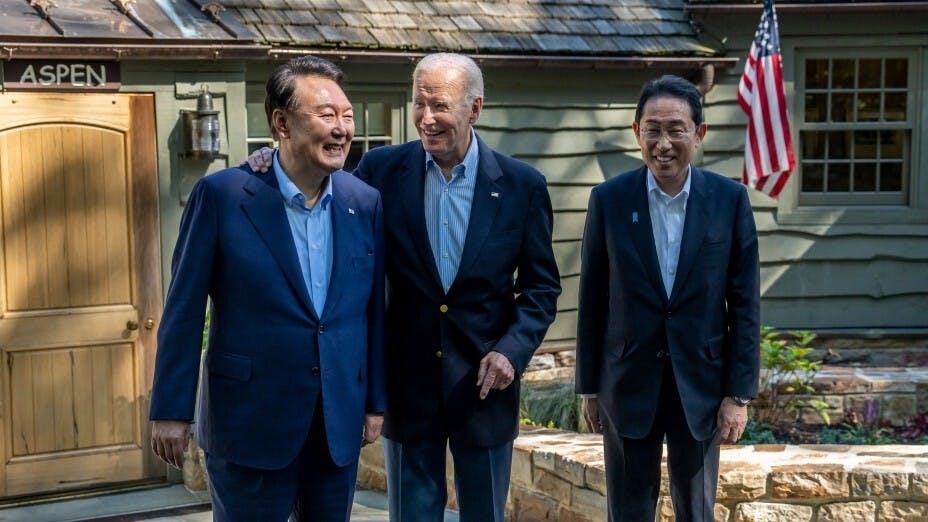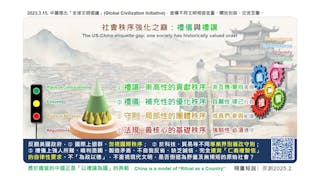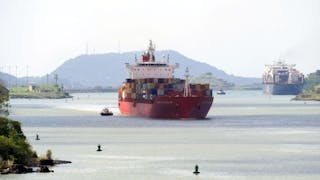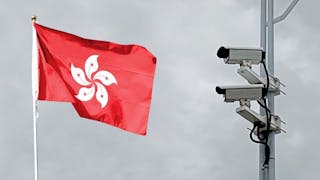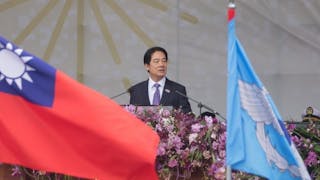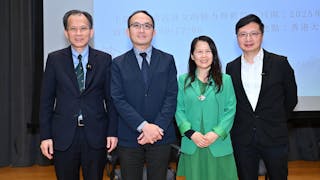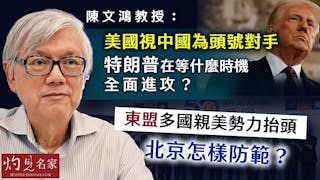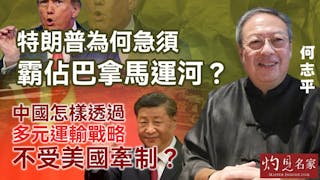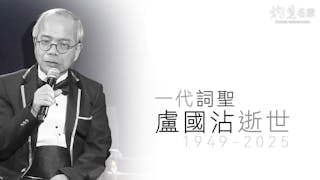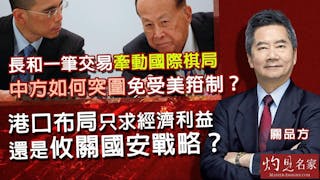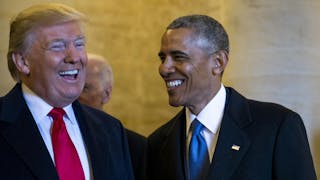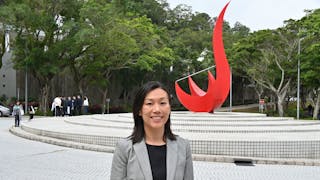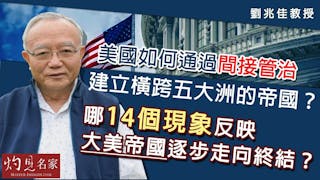美國總統拜登、南韓總統尹錫悅和日本首相岸田文雄舉行的大衛營峰會,不僅對於美國盟友之間建立同盟的地緣政治產生重要影響,而且對中國的反應,以及北京如何應對金磚國家(巴西、俄羅斯、印度、中國和南非)的快速發展也產生重要影響。
大衛營原則 強調三邊安全合作
拜登在大衛營與尹錫悅和岸田文雄舉行歷史性峰會,提出「大衛營原則」,三國在加強三邊安全合作、促進亞洲和平穩定方面有着共同目標,並反對任何「單方面改變印太地區海域現狀的企圖」。
《大衛營精神》包括三方發表的聲明:「我們重申台海和平與穩定的重要性,是國際社會安全與繁榮不可或缺的要素。我們在台灣問題上的基本立場沒有改變,主張和平解決兩岸問題。」
這三個國家通過強調相互協調、溝通和制定戰略的重要性來應對他們所謂的威脅。這些威脅包括貿易爭端、北韓的導彈威脅、海上挑釁和互聯網攻擊。三國政府承諾盡快相互磋商,這是一個「制度化」的過程,美國、日本和南韓領袖將舉行年度會議並分享有關北韓的軍事和其他情報。此外,三國還將定期舉行軍事演習。據發表的《大衛營精神》聯合聲明稱,他們反對俄羅斯,並一致支持烏克蘭。
儘管美方公開表示此次峰會不針對任何特定國家,但正如尹錫悅明確提到的那樣,北韓看來是最大的威脅。
美方提到華盛頓無意組建所謂「亞洲版北約」,這是中國政治觀察家和評論人士提到的擔憂。
坎貝爾:令人嘆為觀止的外交
美國總統副助理兼印太事務協調員坎貝爾8月16日讚揚了尹錫悅和岸田文雄在修補充滿歷史包袱的韓日關係方面所表現的勇氣,稱之為「令人嘆為觀止的外交」。他形容,首爾和東京「將兩國關係提升到了一個新的高度」。
坎貝爾表示,大衛營峰會「符合拜登總統為美國盟友和合作夥伴投注的努力,既以傳統方式鞏固與日本和韓國的關係,也以四方合作等創新方式,就像在烏克蘭面對俄羅斯可怕的入侵時,集結印太地區對烏克蘭的支持一樣」。他進一步闡述說,美國「不僅尋求在未來鎖定日韓,而且還尋求鎖定美國,我們將繼續保持接觸、超前部署,並在以印太地區為代表的重要地區保持存在」。
坎貝爾的講話至少在兩個方面具有重要意義。首先,美國在亞太地緣政治戰略上熱衷於與日韓結盟。其次,日韓似乎擔心美國對亞洲外交政策可能發生變化,特別是在2024年美國總統大選之後。特朗普時代美國的任何孤立主義傾向都會使東京和首爾的國家安全陷入危險。因此,史無前例的大衛營峰會旨在鎖定美日韓國的牢固同盟。
據報道,拜登和岸田文雄私下討論了美日如何開發新型高超音速導彈,這種導彈能夠攔截來自北韓、中國和俄羅斯的導彈。兩人的深入討論加強了美日同盟。
就在中國海警船與菲律賓軍用補給船發生水炮事件後不久,有報道稱,美國、澳洲和日本軍方將向菲律賓提供大型軍艦。此外,美國、澳洲、日本和菲律賓即將於8月23日舉行聯合軍演,這表明所有舉措都是為了威懾南海所謂的「威脅」。
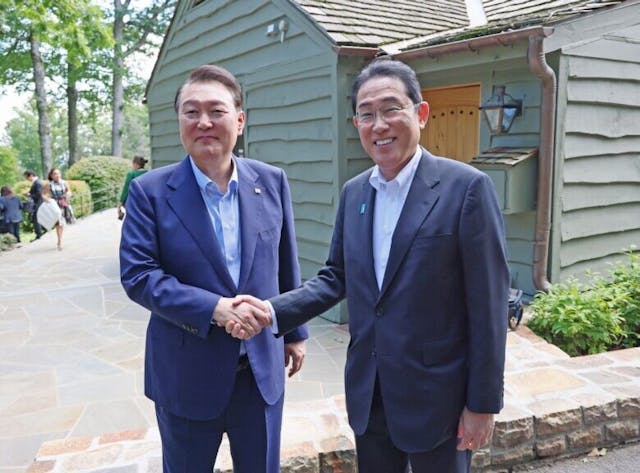
中國批評美國搞小集團
中國對三邊峰會迅速作出反應。中國外交部發言人汪文斌8月18日表示,各方應秉持安全共同體理念,堅持「真正多邊主義」,協力應對各種安全挑戰。他又說,任何國家都不應以犧牲他國安全利益,損害地區和平穩定為代價,謀求自身安全──他批評美國搞小集團可能會損害其他國家的利益。汪文斌表示,亞太地區不應成為地緣政治鬥爭和排他性「小圈子」的角鬥場,任何將「軍事集團」帶入亞太的企圖,勢必招致地區國家的「警惕和反對」。
中國駐韓國大使邢海明表示,對話談判是緩解朝鮮半島緊張局勢的唯一正確有效途徑,任何加強軍事態勢的舉動都將加劇地區陣營對抗風險。因此,他說,中國反對任何針對或影射中國或干涉中國內政的行為。
很明顯,邢海明是在評論《大衛營精神》提到台灣。根據北京的說法,台灣問題是中華人民共和國的內政。
大衛營峰會不僅對亞太地區,而且對中國國家主席習近平即將出席的金磚國家領導人峰會也具有重要的地緣政治影響。
首先,大衛營峰會是美韓日軍事和意識形態同盟日益牢固的象徵。8月18日《大衛營精神》聯合聲明明確使用「同盟」一詞來指代美國與韓國和日本的關係。由於南韓總統尹錫悅採取明顯的親日立場,三邊同盟比以往任何時候都更加強大,並且在後新冠時代前所未有地強大。
其次,美日韓已經建立了牢固的軍事、科技和防務同盟,並與美國主導的另外兩個組織,即美國、日本、澳洲和印度組成的「四方安全對話」(QUAD),以及澳洲、美國和英國組成的「澳英美三方安全夥伴關係」(AUKUS)合作──這個地緣政治格局自然刺激了中國的迅速反應。亞太地區正在出現一場新的冷戰,美國的盟友將俄羅斯、中國和北韓組成的集團視為軍事威脅。
世界各國將會加速組成聯盟
第三,可以預見,世界各國將會加速組成聯盟。國家主席習近平將出席在南非舉行的金磚國家領導人峰會,據報道,世界上還有40個國家願意參加,其中包括阿根廷、伊朗和沙特阿拉伯 如果說金磚國家是對抗美國影響力、甚至主張在全球經濟貿易和交易中使用本國貨幣而不是美元的南南合作集團,那麼美國主導的全球秩序現在就面臨巨大的挑戰。事實上,2001年,全球70%的經濟交易都是以美元進行的,但現在這個數字已降至 59%。
儘管世界需要很長時間才能減少在全球經濟交易中使用美元,但包括金磚國家在內的一些國家愈來愈多地呼籲盡量減少在全球貿易交易中使用美元,這正是美國盟友與敵對陣營之間快要爆發貨幣戰爭的信號。
第四,在東北亞地區安全方面,北韓仍是美國及其盟友,特別是南韓和日本的敵人。最近的報道指出,受颱風卡努吹襲的北韓出現了飢饉現象,甚至出現了社會動盪。然而,北韓仍然是一個能夠抵禦自然災害和內部動亂的社會主義國家,這與外界觀察人士多次犯下的所謂「即將崩潰」的錯誤論調不同。
北韓與美國、南韓和日本之間發生任何擦槍走火的事故,都將是東北亞地區安全中最糟糕的情況。 因此,美日韓之間新設立的共享情報熱線,或許是防止與北韓突然爆發衝突的一項明智舉措。
第五,正如聯合聲明中明確指出的那樣,中國仍然是《大衛營精神》的主要目標,儘管美國官員矢口否認有任何單一目標。華盛頓、首爾、東京領導層的心中出現了兩個問題:中國在南海的舉動和台灣的未來。 雖然所有對南海諸島提出主權主張的利益相關者,相互之間都需要克制,但從北京的角度來看,台灣問題是中華人民共和國的內政。
台灣的副總統賴清德「過境」美國,引起大陸的批評,隨後解放軍在台灣周邊地區展開軍事演習。在這裏,美日韓國之間設立共享情報熱線,可能成為三國與中國關係的一根刺,北京顯然將其視為試圖干涉大陸未來如何處理台灣問題。
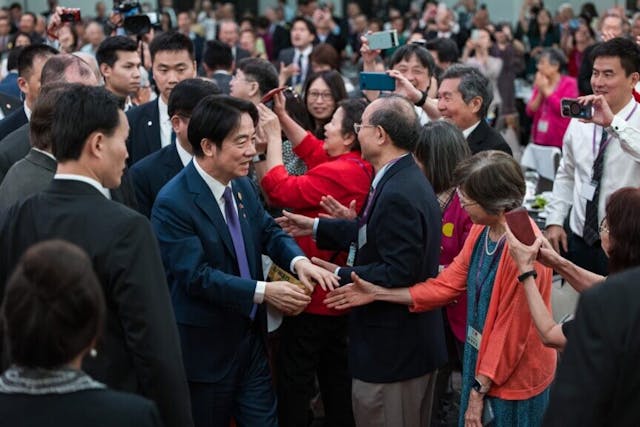
總而言之,《大衛營精神》是美日韓之間建立意識形態軍事同盟進程的見證。三國共同的資本主義民主意識形態將軍事、國防和科技合作鞏固到了前所未有的程度。三國對烏克蘭和俄羅斯的政治立場是顯而易見的。然而,三國與中國的關係勢必緊張,特別是在聯合聲明中談及南海和台灣問題。中方對大衛營峰會的負面反應是自然而且可以理解的。中國很可能會利用擴大金磚國家成員,作為制衡美國盟友和亞太地區其他以美國為首的相關軍事組織的力量。儘管美方聲稱大衛營峰會並不代表任何「亞洲版北約」,但中國對此次峰會的看法卻恰恰相反,北韓對華盛頓─首爾─東京同盟也抱持負面看法。亞太地區正進入一個格外充滿挑戰的時代,和平與安全的所有利益攸關方都必須保持最大限度的克制,增進相互了解,以更加迫切和深入的方式加強對話和談判,比以往任何時候都更重要。
The US-Korea-Japan Summit and Geopolitics of Alliance-Building
The Camp David Summit between US President Joe Biden, South Korean President Yoon Suk Yeol and Japanese Prime Minister Fumio Kishida had important implications for not only the geopolitics of alliance-building among the US allies, but also the responses of the People’s Republic of China (PRC) and how Beijing may deal with the rapid development of the BRICS (Brazil, Russia, India, China and South Africa).
Biden met Yoon and Kishida in a historical summit of his retreat at Camp David, coming up with the “Camp David Principles” in which the three countries share the common objectives of strengthening trilateral security cooperation, enhancing peace and stability in the Asian peace and stability, and opposing any “unilateral attempt at changing the status quo in the waters of the Indo-Pacific region.”
The Camp David Spirit includes a statement issued by the three sides: “We affirm the importance of peace and stability across the Taiwan Strait as an indispensable element of security and prosperity in the international community. There is no change in our basic positions on Taiwan, and we call for a peaceful resolution of cross-Strait issues.”
The three countries responded to their perceived threat by emphasizing the importance of mutual coordination, communication and strategic formulation. These threats include trade disputes, the missile threat from North Korea, provocations on the waters, and Internet attack. The three sides reached a “commitment to consult” with each other – a process of “institutionalization” in which the leaders of US, South Korea and Japan will hold annual summit and share military and other intelligence about North Korea. Moreover, the three countries will conduct regular military exercises. They also stand against Russia and are united behind Ukraine, according to the published Camp David Spirit.
Although the US side publicly remarked that the summit did not target at any specific country, it seems that North Korea is the main target of perceived threat, as mentioned explicitly by President Yoon.
The US side mentioned that Washington does not aim at forming any so-called “Asian NATO,” which is a worry mentioned by political observers and commentators in the PRC.
The Deputy Assistant to the US President and Coordinator for Indo-Pacific Affairs, Kurt Campbell, said on August 16 that the South Korean and Japanese sides had already achieved “a breathtaking kind of diplomacy” even against the suggestions of their own counselors and advisors. He added that both Seoul and Tokyo “elevate their relationship into a new plane.”
Campbell remarked that the Camp David Summit “is in keeping with the efforts that President Biden has taken to invest in American allies and partners, both in a traditional way, strong relations with Japan and South Korea, but also in innovative ways like the QUAD, like mustering Indo-Pacific support for Ukraine as they faced down a terrible invasion from Russia.” He elaborated further that the US is “seeking not just to lock in Japan and South Korea for the future, but the US as well, that we will continue to remain engaged, forward deployed, and present in the dominant and important region that the Indo-Pacific represents.”
Campbell’s remarks are significant in at least two aspects. First, the US is keen to build up its alliance with South Korea and Japan in its geopolitical strategy in the Asia-Pacific region. Second, South Korea and Japan appear to worry about the possibility of any change in the US foreign policy toward Asia, especially after the 2024 US Presidential election. Any drift toward US isolationism in the Donald Trump era would plunge the national security of Seoul and Tokyo into jeopardy. As such, the unprecedented Camp David Summit aimed at locking the US into the solid alliance with South Korea and Japan.
It is reported that Kishida and Biden had a private discussion on how both sides would develop a new type of supersonic missile that can and will intercept enemy missiles from North Korea, China and Russia. Their deep discussion strengthened the US-Japan alliance.
Shortly after the water cannon saga that involved the Chinese marine police vessel and the Philippines military supply boats, it is reported that US, Australia and Japan’s Defense Force would supply large military vessels to Manila. Furthermore, a joint military exercise involving the US, Australia, Japan and the Philippines would be conducted soon on August 23 – a sign that all the moves have aimed at deterring the perceived “threat” on the South Sea.
The PRC has reacted to the trilateral summit promptly. The PRC Foreign Ministry spokesperson Wang Wenbin said on August 18 that all sides should stick to the principle of common security, that “real multilateralism” should be maintained, and that all sides should cope with various challenges to security. Moreover, he added that no country should seek to protect its own security at the expense of the security interests of other countries – a criticism that the US engages in bloc-building that can hurt the interests of other states. Wang elaborated that the Asia-Pacific region should not become an arena of geopolitical struggles and of forming “small circles” that exclude others, and that any camp that bring “military syndicates” into the region would be “warned and opposed” by other countries.
The Chinese Ambassador to South Korea, Xing Haiming, elucidated that dialogue and negotiation are the only effective channel of relieving the tense situation in the Korean peninsula, and that any move of strengthening military gestures would run the risk of exacerbating the confrontations among camps. As such, he added, China opposes any move that targets or implicates it or intervenes in the PRC’s internal affairs.
It is obvious that Xing was commenting on the Camp David Spirit’s mentioning of Taiwan, which according to Beijing is the PRC’s internal affair.
The Camp David Summit had important implications geopolitically for not only the Asia-Pacific region but also the upcoming BRICS summit during which the PRC President Xi Jinping will attend.
First, the Camp David Summit is a symbol of the increasingly solid military and ideological alliance between the US, South Korea and Japan. The Camp David Spirit’s Joint Statement on August 18 explicitly used the term “alliance” to refer to the US relations with South Korea and Japan. Since President Yoon of South Korea has adopted a prominently pro-Japan position, the trilateral alliance is much stronger than ever before and has become unprecedented in the post-Covid era.
Second, this trilateral alliance has already built up a solid military, technological and defense alliance, which is working alongside the other two US-led organizations, namely the QUAD composed of US, Japan, Australia and India, and AUKUS composed of Australia, UK and the US – a geopolitical formation that has naturally stimulated the rapid responses from China. A new Cold War is emerging in the Asia-Pacific region in which the US allies see a bloc composed of Russia, China and North Korea as a perceived military threat.
Third, it can be anticipated that alliances-building in the world is going to be accelerated. The PRC President Xi Jinping is going to attend the BRICS Summit in South Africa amid reports that forty more countries in the world would like to participate in it, including Argentina, Iran and Saudi Arabia. If BRICS represent a bloc of South-South cooperation countering the influence of the US and even advocating the use of their own currencies rather than the US currency in global economic trade and transactions, the US-led global order is now facing a tremendous challenge. In fact, in 2001, 70 percent of the global economic transactions were conducted in US currency. But now the figure is down to 59 percent.
Although it takes a long time for the world to reduce the usage of US currency as its global economic transactions, the increasing call of some countries, including those in BRICS, to minimize the usage of US currency in global trade transactions, is signaling a currency war between the US allies and their opposing camp.
Fourth, in terms of Northeast Asian regional security, North Korea remains an enemy of the US and its allies, notably South Korea and Japan. Recent reports have pointed to the emergence of hunger and even social unrest in North Korea which was plagued by the attack of typhoon Khanun. However, North Korea remains a resilient socialist state against natural disasters and internal unrest, unlike what outside observers who had repeatedly made mistakes about its so-called “imminent collapse.”
Any military accident between North Korea on the one hand and the US, South Korea and Japan on the other hand would be the worst-case scenario in Northeast Asian regional security. As such, an emergence of the new crisis hotline among the US, South Korea and Japan is perhaps a good move to prevent any sudden emergence of conflicts with North Korea.
Fifth, China remains a key target of the Camp David Spirit, as stated quite explicitly in the Joint Statement albeit US officials verbally denied any single target. Two issues have emerged in the psyche of Washington-Seoul-Tokyo leadership: China’s moves in South Sea and the future of Taiwan. While mutual restraint is necessary for all stakeholders laying their sovereignty claims on the islands of South Sea, the future of Taiwan is an internal affair of the PRC from Beijing’s perspective.
The ongoing visit of the Vice President of Taiwan, William Lai, to the US has triggered the PRC’s criticisms, followed by the launch of Chinese military drills around the island republic. Here, the emergence of a crisis hotline among the US, South Korea and Japan will likely be a thorn in their relations with China, which obviously regards it as an attempt at interfering with how Beijing deals with Taipei in the future.
In conclusion, the Camp David Spirit is a testimony to a process of building up the ideological-military alliance between the US on the one hand and South Korea and Japan on the other hand. Their common ideology of capitalist democracy has solidified the military, defense and technological cooperation to an unprecedented degree. Their political stance on Ukraine and Russia is obvious. However, their relations with China are destined to be strained, especially on the Joint Statement’s comment on South Sea and Taiwan. China’s negative responses to the Camp David Summit are natural and understandable. It is likely that the PRC will utilize the expansion of BRICS membership as a counterweight to cope with the US alliance and other related US-led military organizations in the Asia-Pacific region. Although the US side asserts that the Camp David Summit does not represent any “Asian NATO,” the perception of the PRC toward the Summit is the contrary, so as how North Korea perceives the Washington-Seoul-Tokyo alliance. As such, the Asia-Pacific region is now stepping into a particularly challenging era during which all the stakeholders of peace and security will have to exercise their utmost restraint, increase their mutual understandings, and enhance dialogue and negotiations in a far more imperative and intensive way than ever before.
原刊於澳門新聞通訊社(MNA)網站,本社獲作者授權轉載。原文網址:https://www.macaubusiness.com/opinion-the-geopolitics-of-the-water-cannon-incident-in-south-sea/



